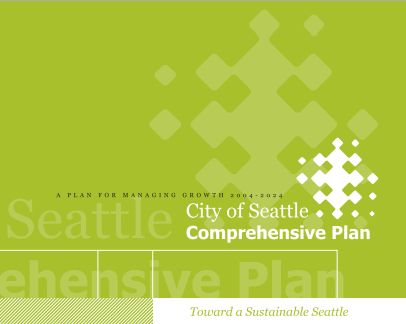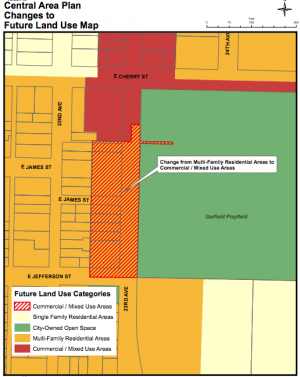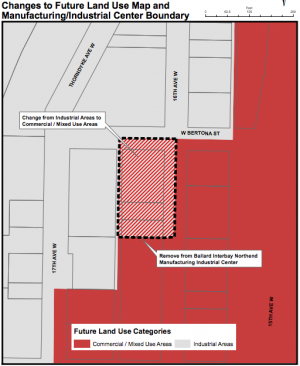 Seattle’s Comprehensive Plan is a constantly evolving policy document. Beyond the state-required update every 10 years, amendments to the Comprehensive Plan can be made annually through the Annual Docket process. Proposed amendments can be initiated by the public, City Council, or the Executive departments.
Seattle’s Comprehensive Plan is a constantly evolving policy document. Beyond the state-required update every 10 years, amendments to the Comprehensive Plan can be made annually through the Annual Docket process. Proposed amendments can be initiated by the public, City Council, or the Executive departments.
The Department of Planning and Development works with the Council and the Planning Commission to determine which proposals should move forward for further review. Once this happens, there is consultation through the process with other departments and Council as the proposals are drafted. Council ultimately reviews and approves a set of amendments to the Comprehensive Plan.
For the 2013-2014 amendment cycle, DPD has evaluated a number of proposed changes with two given the green light for Council consideration. The areas within the scope of the review are the Central Area and Interbay. The proposed amendments for the Central Area would involve revisions to policy text and a future land use map designation change. Meanwhile, the proposed amendment for Interbay consists a future land use map designation change for three parcels.
On Tuesday, the City Council’s Planning, Land Use, and Sustainability (PLUS) Committee held a public hearing on the proposed amendments. A follow-up meeting for PLUS is scheduled for April 18th, essentially the last step before a full Council vote can be held on the matter.
More after the jump.
Central Area
 The proposed changes would update the Central Area’s neighborhood plan policies and goals. It would also revamp the the introduction and history of the neighborhood. For instance, the proposed changes would update goals for three community nodes along 23rd Ave. The goals would now go into greater depth to describe the quality and purpose of each node. The changes would also emphasize support infrastructure improvement, better connections to transit, encourage the creation of more affordable housing through incentives and publicly-owned property, and cultivating the diverse cultural character of the neighborhood.
The proposed changes would update the Central Area’s neighborhood plan policies and goals. It would also revamp the the introduction and history of the neighborhood. For instance, the proposed changes would update goals for three community nodes along 23rd Ave. The goals would now go into greater depth to describe the quality and purpose of each node. The changes would also emphasize support infrastructure improvement, better connections to transit, encourage the creation of more affordable housing through incentives and publicly-owned property, and cultivating the diverse cultural character of the neighborhood.
The more significant element in the proposed changes are the Future Land Use Map (FLUM) amendments along 23rd Avenue between East Cherry Street and East Jefferson Street. The FLUM would see a land use designation change from Multi-Family to Commercial/Mixed-Use. The area affected by the changes is home to Garfield High School, a community center, and a mix of residential and commercial uses.
These properties are currently zoned LR2. While no rezone is associated with the FLUM amendment, contract rezones are anticipated in the future. In the vicinity (but outside of the proposed FLUM changes), a contract rezone is already underway at 2301 E Union St. The rezone is proposed to go from NC2-40/NC2P-40 to NC3P-65, something that may be in store for this 23rd Ave area.
Interbay
 The Interbay future land use designation change affects three parcels which total about one acre. This change would involve two elements:
The Interbay future land use designation change affects three parcels which total about one acre. This change would involve two elements:
- The parcels would be removed from the Ballard-Interbay-Northend Manufacturing/Industrial Center, and
- They would convert from Industrial to Commercial/Mixed-Use land uses.
The purpose of the changes is to reflect actual uses on the ground. These three properties consist of a grocery store (QFC) and a fitness center. Commercial activities such as these have long existed on the parcels with a very low likelihood that industrial uses will ever return. From the perspective of DPD, it makes sense to simply recognize these land uses and enshrine them in the Comprehensive Plan. By doing so, the properties can continue their commercial uses and more easily redevelop in the future.
Upcoming Cycle
In a future article, I will cover the three proposed amendments that were tabled earlier on in this cycle. In brief, these amendments would address industrial policies, Stadium District policies and goals, and the University Community Urban Center Plan. Those amendments have been deferred until a future amendment cycle.
Stephen is a professional urban planner in Puget Sound with a passion for sustainable, livable, and diverse cities. He is especially interested in how policies, regulations, and programs can promote positive outcomes for communities. With stints in great cities like Bellingham and Cork, Stephen currently lives in Seattle. He primarily covers land use and transportation issues and has been with The Urbanist since 2014.



